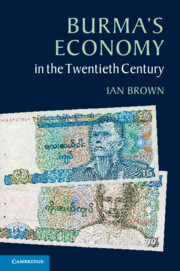Book contents
- Frontmatter
- Dedication
- Contents
- List of Illustrations
- List of Tables
- Note on names
- Acknowledgements
- Map of Burma/Myanmar
- Introduction
- 1 The economy at the beginning of the twentieth century
- 2 Strains in the late colonial economy
- 3 War and independence
- 4 In pursuit of socialism
- 5 Toward the market: the economy from 1988
- Conclusion: themes and threads
- Bibliography
- Index
- References
4 - In pursuit of socialism
Published online by Cambridge University Press: 05 June 2014
- Frontmatter
- Dedication
- Contents
- List of Illustrations
- List of Tables
- Note on names
- Acknowledgements
- Map of Burma/Myanmar
- Introduction
- 1 The economy at the beginning of the twentieth century
- 2 Strains in the late colonial economy
- 3 War and independence
- 4 In pursuit of socialism
- 5 Toward the market: the economy from 1988
- Conclusion: themes and threads
- Bibliography
- Index
- References
Summary
Military rule and the establishment of the Burmese Way to Socialism
In April 1958, the AFPFL government of U Nu, in power since Burma had regained its independence in January 1948, split into a ‘Clean’ faction, led by U Nu and the Minister of Agriculture and Forests, Thakin Tin, and a ‘Stable’ faction led by the socialists U Ba Swe and U Kyaw Nyein. U Nu's parliamentary position was now precarious – he scraped through a vote of confidence in June, but in August was forced to use a presidential decree to pass the annual budget – and in late September the prime minister was convinced by two senior Rangoon-based staff officers to transfer power to an army caretaker government under the army commander, General Ne Win, pending the holding of elections. It was a coup with pressured consent. The formal transfer of power took place in late October 1958.
The caretaker government set itself three main objectives, in its own words, ‘to bring about law and order; secondly, to combat economic insurgents; and thirdly, to hold a fair and free election’. And it was broadly successful in meeting those objectives. Serious crime fell by one-third, and economic crimes, notably ‘black-marketeering rackets’, were more rigorously investigated and brought to the courts; over 150,000 squatters were removed from Rangoon's slums and settled in new satellite towns; and a national election was held, even if not altogether fair and free and somewhat later than first intended, in February 1960.
- Type
- Chapter
- Information
- Burma's Economy in the Twentieth Century , pp. 131 - 175Publisher: Cambridge University PressPrint publication year: 2013



